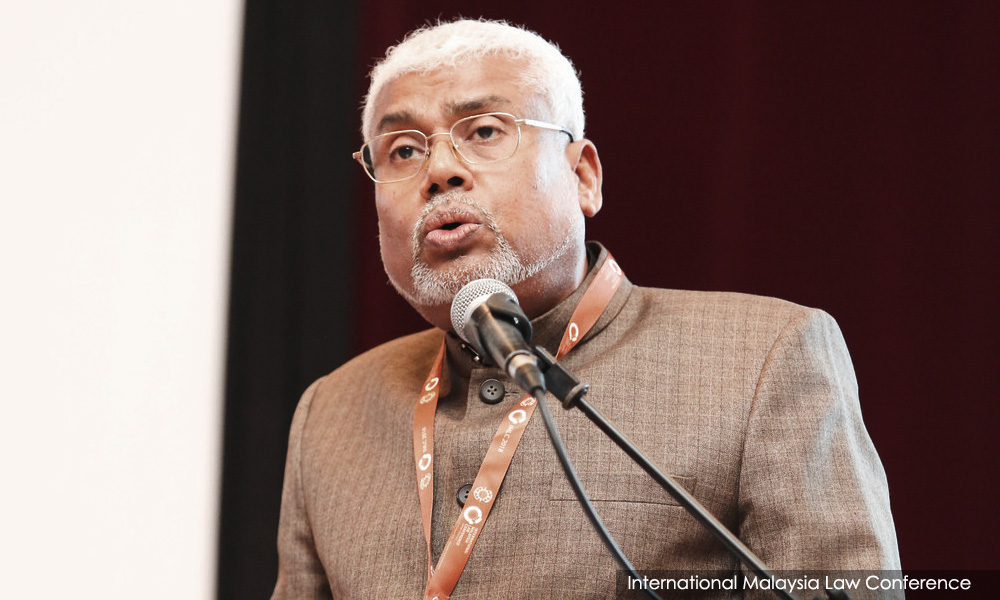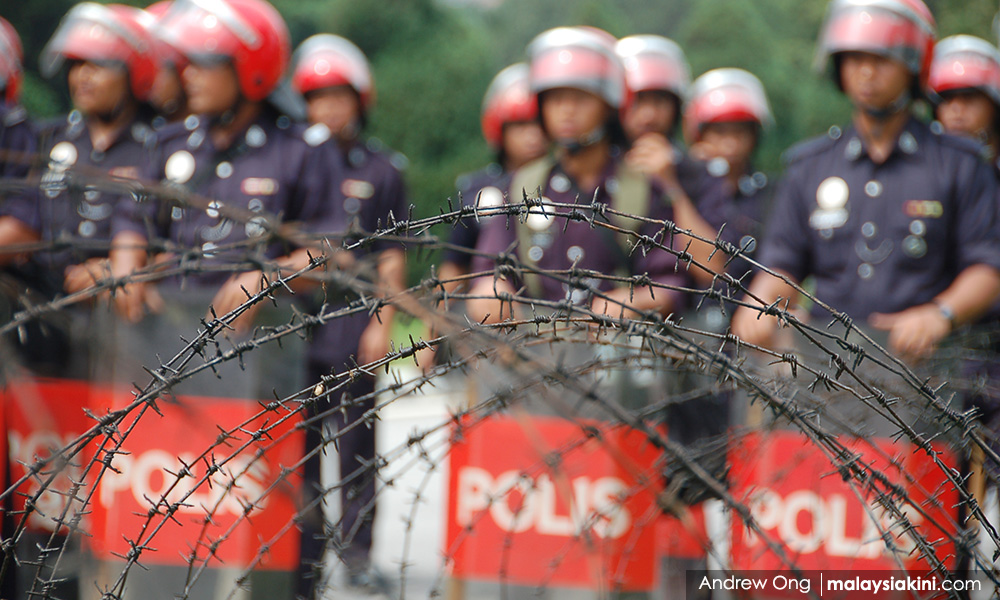COMMENT | Having read the shocking revelations contained in the affidavit of Court of Appeal judge Hamid Sultan Abu Backer, a royal commission of Inquiry must be formed to investigate these unprecedented allegations made by such a senior and eminent appellate court judge against other members of the judiciary, both serving and recently retired.
The Malaysian Bar must take a firm stand on whether we want to work with a discredited judicial institution that has done very little since 1988 to restore public confidence in its independence and integrity. If the RCI is not formed, the Bar should consider boycotting the courts until such action is taken by the Pakatan Harapan government to stem the rot in the judiciary.
A legal system cannot function without lawyers and litigants. There is ample precedent for this from jurisdictions like India, Pakistan, Sri Lanka and the UK in recent times.
Why bother engaging with the judiciary when nothing has changed despite having a new government after 61 years? The only thing I have read in the press over the last nine months is the same pious platitudes from superior court judges, but little of substance to merit confidence.
To make matters worse, the same smug faces are still sitting on the bench, smirking that they cannot be touched because of security of tenure under the constitution, despite the mounting allegations of corruption and misconduct being piled against them.
No statute of limitation
To remove sitting judges under Article 125 of the constitution is cumbersome, but forming an RCI to investigate them is not.
There is no statute of limitation for violating the constitution and the rule of law. So what if some of these judges have retired or were forced to retire from the bench by the new government? Do we just let them go with their undeserved titles and pensions and behave as if everything is well and good in the judiciary?
Some of their enablers and supporters are still sitting on the bench, undoubtedly praying for the return of Umno-BN to save them from perdition.

If the current chief justice has investigated the allegations, then he should disclose his findings, rather than make a broad statement that the top judges in question have since retired and no action can be taken. What about the remnants in the judiciary aligned to these top judges? Why shouldn’t action be taken against them?
The MACC investigations into Hamid’s allegations is the right first step. The agency should extend the scope of its investigations to cover the retired and serving judges in question, including conducting a forensic examination of their assets.
Lawyers closely associated with the former government and ruling party, who used to claim that they could fix the quorum and the outcome of cases in the superior courts in return for large sums of money – purportedly due to their connections to certain top judges – should also be questioned by the MACC, because the names of the top judges allegedly involved were identical to those alluded to in Hamid's affidavit.
Hidden hands
It is a known fact that a cabal of since-retired top judges still have disciples, acolytes and minions in the Federal Court, the Court of Appeal and the High Court to perpetuate their legacy.
There are hidden hands working within and without the judiciary, even some associated with the former regime, who are actively engaging, promoting and furthering the interests of a certain group of subservient and compliant judges.
These are judges who seem to subscribe to the view that they are servants of the government and must always protect and safeguard its interests, politicians and their business associates, and more importantly defend the narrative of race and religion supposedly for the sake of national unity, political stability and public safety.
Why is the Harapan government reluctant to investigate and expose these judges to the scrutiny of an RCI, the media and the public? The de facto law minister has been ineffective since his appointment. Since politicians from PKR, DAP, Amanah and various NGOs opposed to the former Umno-BN government were often the victims of egregious miscarriages of justice, a better candidate should have been appointed as law minister.

Why must the legal affairs division be under the Prime Minister’s Department and not be a fully functioning ministry for law, justice and constitutional affairs? Every other civilised country in the world has such a ministry. It does not impede upon the independence of the judiciary, but rather makes the institution open to scrutiny in parliament and by the media.
The Harapan government must fully implement their manifesto promises in relation to the judiciary before the institution is beyond redemption.
An entire generation of judges post-1988 has grown up with an ethos that is contrary to everything that the rule of law and the administration of justice stands for in a functioning democracy. Self-interest permeates every level of the judiciary at present, to the extent that justice is neither done nor seen to be done in a great many instances.
Destroying democracy
It is sad to read the contents of the learned appellate judge’s affidavit, because what it suggests is that the very persons who are supposed to protect and defend our hard-fought freedoms and liberty after centuries of colonial rule and the subsequent communist insurgency, have turned out to be insidious tyrants destroying the edifice of our democracy and fundamental freedoms.
Based on the learned judge’s allegations, how can our judges – the majority of whom are Malay and Muslim – take a constitutional oath to defend the supreme law and then go on to violate the constitution, practice and condone corruption for the sake of personal enrichment, and oppress those who seek justice – including the poor, the neglected and the marginalised – and yet claim to be good Muslims?
Hamid's (photo) allegations on the improper interference by top judges in the Anwar Ibrahim, M Indira Gandhi and Karpal Singh appeals at the Court of Appeal is sufficient reason to form an RCI to investigate and ferret out these traitors to the constitution and the rule of law.
Having been a lawyer for the last 26 years, I do not claim to be a brilliant one or a great advocate, but I can safely say that a third of our judges have integrity issues, ranging from outright corruption to an inability to stand up for principles when things are ill done because they fear reprisals from their superiors.
While corruption like immorality can be explained as a character flaw or defect, burying your head in the sand and pretending that everything is fine is cowardice at best and intellectual dishonesty at worst.
Why bother being a judge when you can compromise on your principles so easily for the reward of promotion and recognition? What honour is there in that? Being a superfluous ornament on a tainted bench serves no useful purpose other than guilt by association in the eyes of the wider public.
The other third of the judges are incompetent bordering on ineptitude and inefficiency in the management and disposal of their cases. In some courts the key performance index takes precedence over the law; trials are conducted like in a night market; no proper rulings are made on the evidence; witnesses are intimidated and harassed by the bench; lawyers are treated like the enemy when the judge decides to indulge in premature adjudication to satisfy his moral indignation; basic principles of law need to be explained ad nauseam to the presiding judge; and written submissions are required even for the simplest of applications thereby wasting judicial time and incurring unnecessary costs.
After having to put up with all of this, the end result very often is a perverse decision that needs to be corrected on appeal. But the KPI targets are satisfied and the judge is considered to have discharged his duty.
Forget about the quality of judgments and judicial reasoning. Promotion will follow in due course if the judge is compliant in politically sensitive cases. Is this the kind of judiciary that we want?
The remaining third of the judges are brilliant, independent and fearless advocates of the rule of law and the imperative to do justice without fear or favour. But this small minority is seriously impeded by the alleged corruption and abuses at the top of the judiciary.
Many senior lawyers avoid appointment to the bench, not because of the loss of personal freedom or reduction in income, but rather their desire not be associated with a tainted institution that has limited career prospects and an unwillingness to embrace diversity of thought and independence of action.
Mediocre judges who have managed to weasel their way to the top based on considerations of race, religion, politics, government service and academic background, are determining the direction of our judiciary.
The judiciary is not progressing to become world-class, but rather regressing into something insidious with a veneer of respectability. The problem is that the core is rotten, resulting in the fruit becoming poisonous as well.
Within the next five to ten years, unless something drastic is done by the government, our country can join the ranks of Burma, Sudan and Zimbabwe in terms of the integrity and independence of our judicial institution.
The issues are wide-ranging. At the appeals court, do not expect to get a fair hearing on every occasion. It is more like throwing dice and taking your chances. If you get a good quorum, justice may occasionally be done. Otherwise, you just hope for the best and keep an eye out for grounds to seek leave to appeal to the Federal Court, which is another hurdle in itself.
Why should appeasing your judicial bosses and the prospects for promotion be the determining factor in the discharge of a judicial function or duty? Why the obsession to get to the Federal Court?
Frankly, our apex court has nothing to show compared to the jurisprudence coming out of the supreme courts of the US, UK, India, Canada, Australia and South Africa. The Federal Court is conservative, compliant and predictable.
No judicial dynamism
As Hamid correctly pointed out, there is no judicial dynamism in the decision making of the apex court, but rather judicial inertia bordering on redundancy. The thinking of the court is influenced by ancient and outdated precedents from 30 or 40 years ago, but still religiously defended by the court because it is pleasing to the political establishment, while effectively truncating the fundamental liberties in Part II of the constitution.
A recent example of an outright abdication of the judicial function by the Federal Court and in my view a negation of their judicial oath of office, would be their refusal to adjudicate on the appointment of the former top two judges of the court as additional judges under Article 122 (1A) of the constitution to hold the office of chief justice and president of the Court of Appeal.
This was most likely done out of fear of offending the very persons who had ensured their appointments and promotions to the Federal Court bench. It was intellectually dishonest of the apex court to rely on the academic argument for lack of a live issue when it was being called upon to interpret such an important constitutional provision.
Only last year, a former chief justice glibly told me over lunch that even in Western countries like the US and the UK, their highest courts are not fully free from executive interference. He cited the alleged foreign policy considerations in the UK House of Lords' decisions in the ex parte Augusto Pinochet (No. 2) and (No. 3) cases. If that were true, our judiciary should aspire to be better than those foreign courts.
Instead, political, racial and religious considerations seem to permeate the jurisprudence of our superior courts, rendering their decisions uninspiring and unworthy of serious consideration by legal practitioners at home and abroad, and these decisions are generally viewed with disdain by the public.
Another troubling aspect of Hamid’s affidavit is the pressure that he was put under from a fellow appellate court judge and the top judge when deciding the constitutionality of certain provisions in the Police Act 1967, purportedly on the basis that the court declaring a section of the law to be unconstitutional would cause an Arab Spring-like uprising against the then Umno-BN government.
It is shocking that such a remark could have been made by a judicially trained mind. Is it the role of the judiciary to preserve public order by sanctioning violations of the constitution and the fundamental right to freedom of peaceful assembly and due process under the law?
If a government systemically violates the constitution and undermines the rule of law, the people would be justified to overthrow such an autocratic or rogue government through lawful and unlawful means on the basis of necessity and the right to life and liberty.
The American, French and Russian revolutions are a testimony to this. The fight for independence in India and Indonesia would not have occurred if the people had conformed to the diktats of arbitrary power, as suggested by this ill-informed appellate judge who must, in my view, be a judicial pigmy in terms of intellect and integrity.
An RCI alone will not address the rot. The government must consider fundamental reforms to the selection, appointment and promotion of judges. The membership of the Judicial Appointments Commission (JAC) should be expanded to include representatives of the Bars of Malaya, Sabah and Sarawak, the attorney-general and civil society. The number of judicial nominees in the commission ought to be limited to not more than three.
At least 50 percent of the judges must come from the practising Bar, and not less than 40 percent of the judges should be non-Bumiputera and ethnic minorities. 30 percent of the judges appointed should be women. This will ensure diversity, specialised knowledge, expertise and experience in the judiciary.
There must be comprehensive amendments to the Courts of Judicature Act 1964, the Civil Law Act 1956, the Judges’ Ethics Committee Act 2010 and the Judges’ Code of Ethics to ensure that the judiciary is truly independent from within and without, and imbued with the highest standards of integrity, ethics and competence.
At present, there is no need to increase the retirement age for judges to 70 years until the present batch of judges in the superior courts retire, resign or leave the bench due to natural attrition. This is to ensure that younger, intelligent and untainted judges are elevated to the Federal Court and the Court of Appeal in the short to medium term. Senior lawyers should also be considered for direct appointment to these courts as an interim measure.
Article 122 (1A) of the constitution could be amended to exclude the possibility of additional judges of the Federal Court being made the chief justice of the Federal Court, president of the Court of Appeal and the chief judges of the High Courts in Malaya, Sabah and Sarawak. Provision ought to be made to appoint distinguished foreign judges from Commonwealth countries as additional judges of the Federal Court on a contract basis, as is done in the Brunei Court of Appeal.
A more radical step would be to restore appeals to the Privy Council in constitutional and criminal cases with the special leave of the Judicial Committee for a limited period of 20 years until our judiciary is fully rehabilitated. There should also be a parliamentary select committee on the judiciary to ensure that the institution is free from executive or legislative encroachment.
I fully associate myself with the sentiments expressed by Hamid. He should be granted full protection under the law. Nobody should seek to question his motives in what has probably become the biggest judicial scandal in recent times.
As a judge, he has distinguished himself by remaining steadfastly loyal to the constitution and the judicial oath of office. His lordship is a great inspiration to both the bench and bar and he will be acknowledged as such in the annals of Malaysian and Commonwealth judicial history and jurisprudence.
GERARD LOURDESAMY is a lawyer with 26 years in practice and a Malaysiakini subscriber.
The views expressed here are those of the author/contributor and do not necessarily represent the views of Malaysiakini.




